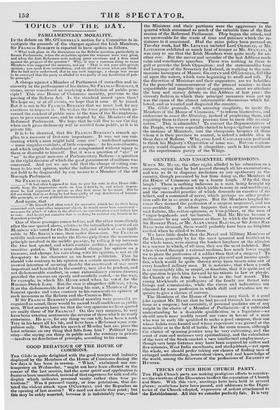TOPICS OF THE DAY.
PARLIAMENTARY MORALITY.
IN the debate on Mr. O'CoNNEee's motion for a Committee to in- vestigate the grounds of the charges against the Irish Members, Sir FRANC IS BuRnerr is reported to have spoken as follows.
" What took place in the discussions on the Reform question, particularly in former Parliaments, when the mljorities against the measure were very great, and when the Anti-Reformers were making great exertions and a firm stand against the progress of the question ? Why, it was a common thing to taunt Members who supported the measure, and say 4 That is not your own private Opinion; you speak front intimidation, and are afraid to avow what you think.' But he had never understood, that by any such language, a change was meant to be conveyed that the party so alluded to was guilty of any dereliction of pub- lic principle."
A charge against a Member of Parliament of cowardice and in- sincerity in the performance of his duties, Sir FRANCIS BURDETT, it Seems, never considered as implying a dereliction of public prin- ciple! This was House of Commons morality, previous to the passing of the Reform Act. Is the standard raised since then ? We hope so; or at all events, we hope that it soon ill be raised. But it is not to Sir FRANCIS BURDETT that we must look for any exertions to improve it. lie wishes the loose principles which go- verned the conduct of public men in the time of the 13ot oughmon- gers to pass current now, and be adopted by the Members of the Reformed Parliament. We hope that he will live to see the day when such gross dishonesty will be scouted from public, as it is in private life. It is to be observed, that Sir FRANCIS BURDETT'S remark ap- plies to a measure of first-rate importance. It was not one con- cerning which a man might hold some crux' ', undefined opinions —some singular crotchets, of little consequel.:- to his constituents, and which might be abandoned or compromised without injury to them or discredit to himself. But it was a question of "aye" or "no" to the great measure of Parliamentary Reform—a question in the right decision of which the good government of millions waa concerned. And yet we are told that the charge of voting con- trary to his real opinion, under the influence of intimidation, was not held to be disgraceful by any means to a Member of the old Borough Parliament.
Sir FRANCIS says, that " It had often happened to hint to give his vote in that House diffe- rently from the impressions made on hint at first by it, and which impres- sions be had expressed in private as they first arose in his mind. But he did not think that in so doing he had been guilty of any dereliction of honour- able principle, or of any political inconsistency."
And again, that
"Ale himself bad often voted fur measures which but for their being connected with some other important ohj..et, he would never have sanctioned— measures for which if taken in the abstract, no consideration could induce him to vote. And lie did not conceive that in so doing he violated any honest or in- dependent principle." One of these passages comes befilre, and the other immediately after the ono quoted above, relative to the intimidation pi actised on Members who voted for the Reform Act, and which al,aie is appli- cable to Mr. SHEIL'S case, then under discussion. Sir FRANCIS artfully endeavoured to make the llousg gulp down the monstrous principle involved in the middle passage, by rollitig it up between the two last quoted, and which contain nothing disagreeable to sensitive palates. That a man should change his opinion on a measure, and change his vote along with his opinion, is not at all derogatory to his character as an honest politician. That he should vote contrary to his opinion on a certain measure, with the avowed intention of securing thereby the enactment of oae »iore important and beneficial to the country, may also be prudent, and not dishonourable conduct, in some extraordinary circuniatances; provided the reasons are openly and manfully stated, —in the way, for example, in which Mr. HUME acted when lie voted for the Russian-Dutch Loan. But the ease is altogether different, when, fr.nu the dishonourable fear of losing his seat, a Member of Par- liament speaks and votes contrary to his conscientious opinion of such measures as the Reform and the Coercion Bills.
If Sir FRANCIS BURDETT'S political morality were generally re- cognized as sound, there would be an end to all confidence as public men. What security have we that the very opinions we have quoted are really those of Sir FRANCIS? On this very occasion, he may have been uttering sentiments the reverse of those which he really entertains. He may, for any thing we can tell, have been a rank Tory in his heart all his life, and have been a Reformer upon com- pulsion only. Who, after bis speech of Monday last, can place the least reliance on any thing that falls from him ? Political hypo- crisy—the saying one thing in public and the contrary in primate —involves no dereliction of principle, according to his canon.




















 Previous page
Previous page